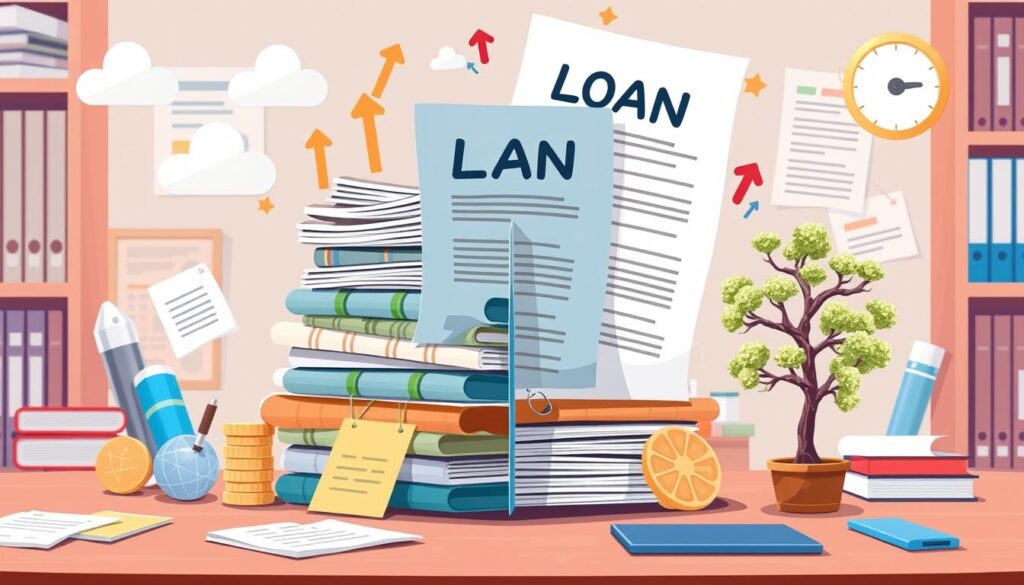Consolidating multiple loans can save you time and money. It combines all your debts into one loan. This has a single interest rate and payment date. It’s a key part of loan and debt consolidation.
This process can make your finances simpler. It might also lower the interest you pay on your debts.
When thinking about consolidating loans, it’s important to consider both sides. You’ll want to look at how it might affect your credit score. You’ll also want to think about the benefits, like lower monthly payments and interest rates.
About 70% of borrowers say it made their monthly payments easier. This makes it a good choice for those with many debts.
Exploring debt and loan consolidation can help you make smart financial choices. You’ll need to think about your credit score, interest rates, and how long you’ll pay back the loan. These are all key parts of the consolidation process.
Understanding the Basics of Loan Consolidation
Loan consolidation combines multiple debts into one loan. This simplifies finances and can save money. It reduces interest costs and makes payments easier to manage.
Many types of loans can be consolidated, like credit card debt and personal loans. Refinancing loans is also an option. The main goal is to get a lower interest rate and easier monthly payments.
Loan consolidation offers several benefits. It simplifies monthly payments and can save on interest. For instance, consolidating high-interest credit cards into one loan with a lower rate can cut monthly payments and save money over time.

To decide if loan consolidation is right for you, consider a few things:
- Interest rates: Compare your current loans’ rates to the consolidation loan’s rate.
- Monthly payments: Look at your current payments and compare them to the consolidation loan’s.
- Credit score: Check your credit score to see if you qualify for a lower interest rate.
| Loan Type | Interest Rate | Monthly Payment |
|---|---|---|
| Credit Card 1 | 20% | $100 |
| Credit Card 2 | 25% | $50 |
| Consolidation Loan | 12% | $120 |
Understanding loan consolidation helps you make smart debt decisions. It can save you money over time. Whether you’re looking to consolidate debt or refinance loans, choose the best option for your finances.
Why People Choose to Consolidate Multiple Loans
Consolidating loans can simplify finances and reduce stress. It combines several debts into one, potentially saving money on interest and lowering monthly payments. This is crucial for those with high-interest credit card debt, as it can lead to a single, more manageable loan with a lower interest rate.
Recent data shows U.S. consumer debt is at $17.94 trillion. Californians have an average personal debt of about $84,730. In these cases, loan consolidation benefits are significant. It allows borrowers to merge their debts into one with a lower interest rate, making repayment easier. For example, combining three credit card debts with rates of 18%, 20%, and 22% APR into a single loan at 12% APR can greatly reduce interest payments.
Some key benefits of consolidating multiple loans include:
- Simplified monthly payments
- Potentially lower interest rates
- Improved credit score opportunities

Understanding why people consolidate loans helps them make better financial decisions. Whether it’s to reduce stress, save money, or improve their credit score, loan consolidation benefits can be a valuable tool for achieving financial stability.
Key Benefits of Consolidating Multiple Loans
Consolidating multiple loans can simplify your life. It means fewer bills to pay each month. For instance, if you have three credit cards with $20,000 balances, you’ll only have one payment to make.
Another perk is saving on interest. Consolidating loans with a lower rate can cut down on interest payments. On average, credit card rates drop from 22.99% to 11% after consolidation. This can save you $115 a month.
Consolidation also boosts your credit score. With fewer bills, you can lower your credit utilization ratio. This is good for your credit score. Plus, timely payments on a consolidated loan can improve your credit history.

| Loan Type | Interest Rate | Monthly Payment |
|---|---|---|
| Original Credit Cards | 22.99% | $1,048 |
| Consolidated Loan | 11% | $933 |
In summary, consolidating loans offers many benefits. You’ll have simpler payments, save on interest, and possibly improve your credit score. Knowing these benefits can help you manage your debt and move towards financial freedom.
Common Drawbacks to Consider
When consolidating multiple loans, it’s key to think about the downsides. A big loan consolidation drawback is you might end up paying more interest over time. Also, you might face upfront fees that can raise the total cost.
Some important things to keep in mind when looking at loan consolidation drawbacks are:
- Potential for higher interest rates
- Upfront fees and charges
- Longer repayment terms
It’s vital to think these over carefully before deciding if consolidating multiple loans is good for you. Knowing the loan consolidation drawbacks helps you make a smart choice and avoid problems.
| Factor | Consideration |
|---|---|
| Interest Rate | Compare rates from different lenders |
| Fees and Charges | Carefully review the terms and conditions |
| Repayment Terms | Choose a term that fits your financial situation |
Different Methods for Consolidating Loans
Understanding the various loan consolidation methods is key. Each method has its own advantages and disadvantages. The right choice depends on your financial situation and goals. It’s important to explore each option to consolidate loans effectively.
Personal Loans
Personal loans can help consolidate debt. They offer fixed interest rates and flexible repayment terms. But, they might have upfront costs like origination fees.
Balance Transfer Credit Cards
Balance transfer credit cards are attractive for debt consolidation. They have an introductory period with zero or very low interest. But, expect a fee of 3% to 5% for the transfer.
Home Equity Loans
Home equity loans offer lower interest rates than credit cards or personal loans. But, they require using your home as collateral. This option might not be right for everyone, like those who don’t own a home.
Debt Management Programs
Debt management programs can help with high debt repayment. They negotiate lower interest rates. But, these programs may have fees and require a commitment to a repayment plan.
Here is a summary of the different loan consolidation options:
| Method | Pros | Cons |
|---|---|---|
| Personal Loans | Fixed interest rates, flexible repayment terms | Upfront costs like origination fees |
| Balance Transfer Credit Cards | Introductory period with zero interest or low interest rate | Balance transfer fees, potential for higher interest rates after introductory period |
| Home Equity Loans | Lower interest rates, using home as collateral | Risk of losing home if unable to repay, upfront costs like closing fees |
| Debt Management Programs | Negotiating lower interest rates, structured repayment plan | Fees, commitment to repayment plan, potential impact on credit score |
How to Prepare for Loan Consolidation
When thinking about loan consolidation preparation, it’s key to know what it means. Consolidating multiple loans can make your finances easier to manage. But, you need a solid plan to do it right. First, check your credit reports for any mistakes and get a clear picture of your debt.
Creating a budget is a big part of loan consolidation preparation. It should include your new loan payments. This helps you keep track of your spending and makes sure you can handle the new monthly costs. Also, look into the interest rates on your loans. Consolidating multiple loans might give you a lower average interest rate.
- Simplified monthly payments
- Potential interest rate savings
- Improved credit score opportunities
Preparing well for loan consolidation helps you make smart choices about your debt. It can lead to a more stable financial future. Always think about the interest rates, repayment terms, and any fees when consolidating multiple loans.
Evaluating Your Current Loan Situation
When you think about loan consolidation, start by looking at your current loans. You need to add up all your debt, check the interest rates, and see how much you pay each month. Knowing this helps you decide if combining loans is a good idea.
Looking into loan consolidation means checking your credit score, income, and how much debt you have compared to your income. It’s important to weigh the good and bad sides of combining loans. This includes how it might affect your credit score and monthly payments.
To start, add up all your debt and look at the interest rates on each loan. Use a debt consolidation calculator to make it easier. Then, see if combining loans will make your payments simpler and save you money on interest.
By carefully looking at your current loans and thinking about the pros and cons of combining them, you’re on the right path. Always keep your financial goals in mind and be open to exploring different options.
Choosing the Right Consolidation Option
When looking at loan consolidation options, think about your credit score, interest rates, and loan terms. The right consolidation loan can help you reach your financial goals. Loans can be from $5,000 to $40,000, lasting 2 to 5 years.
Interest rates for these loans can be from 11.72% to 17.99%. Your credit score greatly affects these rates. For instance, the Citi Double Cash® Card has a 0% intro APR for 18 months, then a variable APR of 18.24% – 28.24%. To make a smart choice, consider these factors:
- Credit score: A good score can get you lower interest rates and better terms.
- Interest rates: Look for loans with competitive rates to save money over time.
- Loan terms: Think about the loan’s length and monthly payments to see if they fit your budget.
Choosing the right loan can simplify your payments, save on interest, and boost your credit score. Research and compare different options to find the best fit for your finances.
With the right loan, you can manage your debt and achieve financial stability. Take your time to consider your options and seek advice if needed.
| Loan Consolidation Option | Interest Rate | Loan Term |
|---|---|---|
| Citi Double Cash® Card | 0% introductory APR for 18 months, then 18.24% – 28.24% | Variable |
| Citi Simplicity® Card | 0% intro APR for 21 months, then 18.24% – 28.99% | Variable |
Impact on Your Credit Score
Understanding how loan consolidation affects your credit score is key. Consolidating loans can change your score in both good and bad ways. At first, your score might drop because of a new account. This is because the new account lowers the average age of your credit accounts.
Also, if the new account has a lower limit than your old ones, your credit utilization might go up. This can also lower your score.
But, making payments on time through consolidation can really boost your score over time. Payment history is 35% of your FICO Score. So, regular payments can help a lot. Also, combining credit card debts into a personal loan can improve your credit mix, which is 10% of your FICO Score.
Here are some important things to think about when considering loan consolidation and your credit score:
- Credit utilization ratio: Keeping this under 30% helps your score.
- Payment history: On-time payments are key to a better score.
- Credit mix: Mixing different types of credit can help your score.
- Hard inquiries: Applying for new credit can lower your score temporarily.
Knowing how loan consolidation can affect your credit score helps you make better choices. Whether you’re looking to consolidate loans or improve your score, it’s crucial to weigh your options carefully. Choose the best plan for your financial situation.
| Credit Score Range | Interest Rate |
|---|---|
| 740 or higher | Best interest rates |
| 739 to 670 | Less favorable interest rates |
| Lower than 670 | Potentially high-interest rates |
Common Mistakes to Avoid When Consolidating Loans
When you think about combining multiple loans, knowing common mistakes is key. This can make paying back easier and might even save you money on interest. But, if not done right, it can cause more problems.
Some common mistakes to avoid include:
- Not reading the fine print: It’s important to understand the loan’s terms to avoid hidden fees.
- Ignoring fees and charges: Fees like origination and balance transfer can quickly increase the loan’s cost.
- Continuing to accumulate debt: Just combining loans doesn’t fix overspending. You need to budget and stay financially stable to avoid more debt.
Knowing these mistakes helps you make better choices when combining loans. This way, you can reach your financial goals.
Remember, combining debts doesn’t always work out. Sometimes, it can even make things worse. So, it’s vital to think carefully and maybe get advice before you decide.
When Loan Consolidation Might Not Be the Answer
For some, consolidating multiple loans might not solve debt problems. In these cases, looking into loan consolidation alternatives is wise. Options like debt management programs or credit counseling might fit better.
Before choosing, think about your financial health. Look at interest rates, repayment terms, and your credit score. Sometimes, the downsides of consolidation, like losing discounts or rebates, outweigh the benefits.
When looking at loan consolidation alternatives, consider these points:
- Debt management programs: They help manage debt and talk to creditors.
- Credit counseling: Non-profit agencies offer advice on debt and budgeting.
- Refinancing: It might work if your credit score has improved since the loan.
Choosing between consolidating multiple loans or loan consolidation alternatives depends on your finances. By weighing the pros and cons, you can pick the best path to financial stability.
| Option | Benefits | Drawbacks |
|---|---|---|
| Loan Consolidation | Simplified monthly payments, potential interest rate savings | May lose benefits, extended repayment period |
| Debt Management Programs | Help with managing debt, negotiating with creditors | Fees associated with the program, credit score impact |
| Credit Counseling | Guidance on managing debt, creating a budget | May not provide immediate debt relief, credit score impact |
Conclusion: Making an Informed Decision About Loan Consolidation
Loan consolidation can simplify debt and save money. But, it’s key to look at your financial situation carefully. You need to consider the benefits and drawbacks before making a choice.
Knowing the basics of loan consolidation and what to consider helps. It lets you choose what’s best for your financial future. Remember, consolidation helps in the short term. But, you must also change your spending habits.
Choosing loan consolidation or other debt management plans is a big step. Understanding your options and practicing smart money habits is the first step to financial freedom. With the right plan, you can manage your debt and secure a better financial future.

